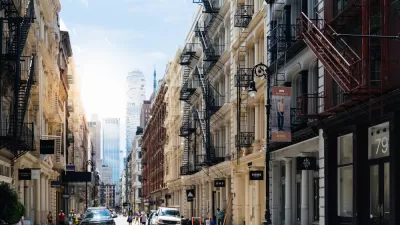As bike share systems spread across the country, Danielle Kurtzleben looks at their profitability, or lack thereof, and asks whether cash-strapped cities or the federal government will want to sink money into systems that struggle to break even.
Kurtzleben looks at the benefits of bike share systems, both economic and non-economic, and asks whether their common reliance on public financial assistance (much like other forms of public transit) is sustainable.
"Bike sharing is costly because it requires more work than simply letting people ride and changing the occasional flat tire. One of the biggest operating costs involves trucking the bikes from full docking stations to empty ones...Optimizing this operations aspect may be key to improving profitability. Josh Moskowitz, project manager at the D.C. Department of Transportation, says a majority of Capital Bikeshare's operations and maintenance costs go toward these rebalancing operations."
Systems rolling out in New York and Los Angeles over the next two years will be funded entirely from private sources, testing whether a successful bike share financial model can be achieved.
FULL STORY: Bike Sharing Systems Aren't Trying to Peddle for Profit

Maui's Vacation Rental Debate Turns Ugly
Verbal attacks, misinformation campaigns and fistfights plague a high-stakes debate to convert thousands of vacation rentals into long-term housing.

Planetizen Federal Action Tracker
A weekly monitor of how Trump’s orders and actions are impacting planners and planning in America.

In Urban Planning, AI Prompting Could be the New Design Thinking
Creativity has long been key to great urban design. What if we see AI as our new creative partner?

King County Supportive Housing Program Offers Hope for Unhoused Residents
The county is taking a ‘Housing First’ approach that prioritizes getting people into housing, then offering wraparound supportive services.

Researchers Use AI to Get Clearer Picture of US Housing
Analysts are using artificial intelligence to supercharge their research by allowing them to comb through data faster. Though these AI tools can be error prone, they save time and housing researchers are optimistic about the future.

Making Shared Micromobility More Inclusive
Cities and shared mobility system operators can do more to include people with disabilities in planning and operations, per a new report.
Urban Design for Planners 1: Software Tools
This six-course series explores essential urban design concepts using open source software and equips planners with the tools they need to participate fully in the urban design process.
Planning for Universal Design
Learn the tools for implementing Universal Design in planning regulations.
planning NEXT
Appalachian Highlands Housing Partners
Mpact (founded as Rail~Volution)
City of Camden Redevelopment Agency
City of Astoria
City of Portland
City of Laramie




























